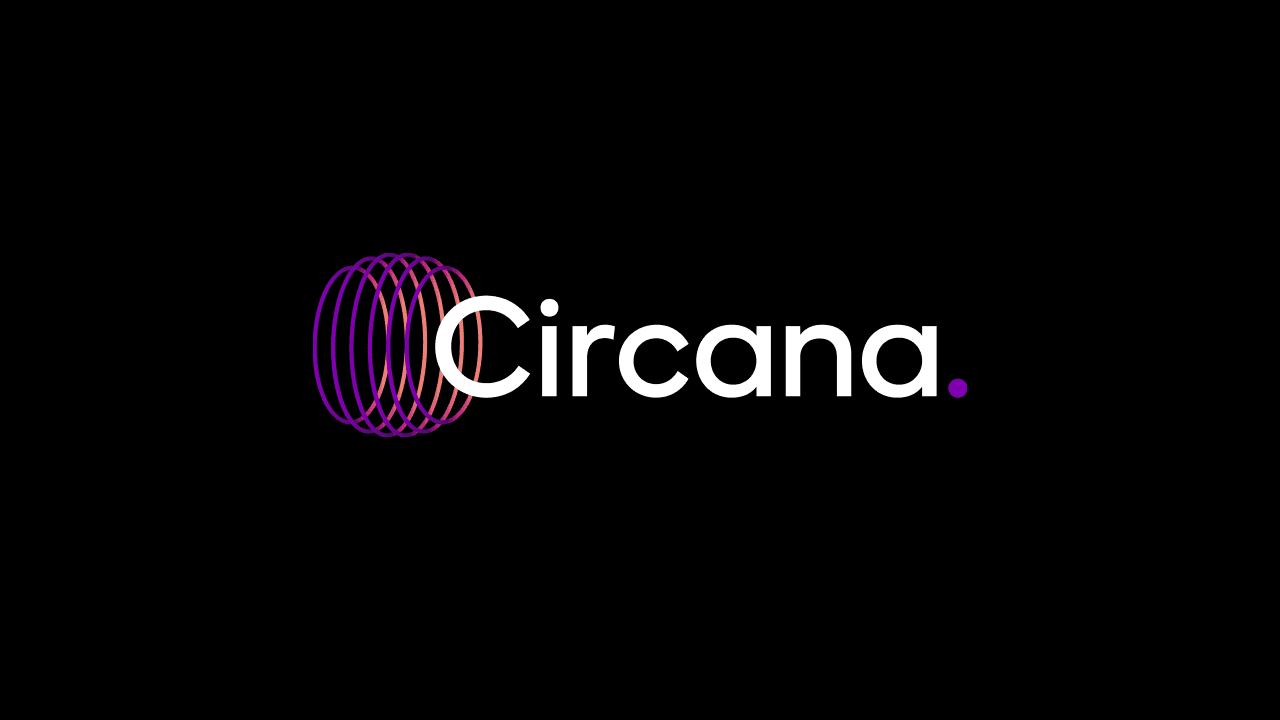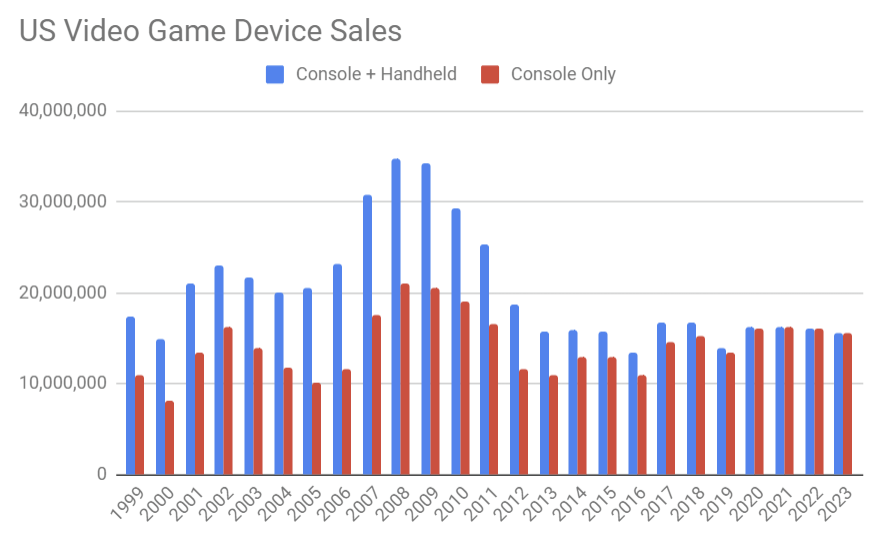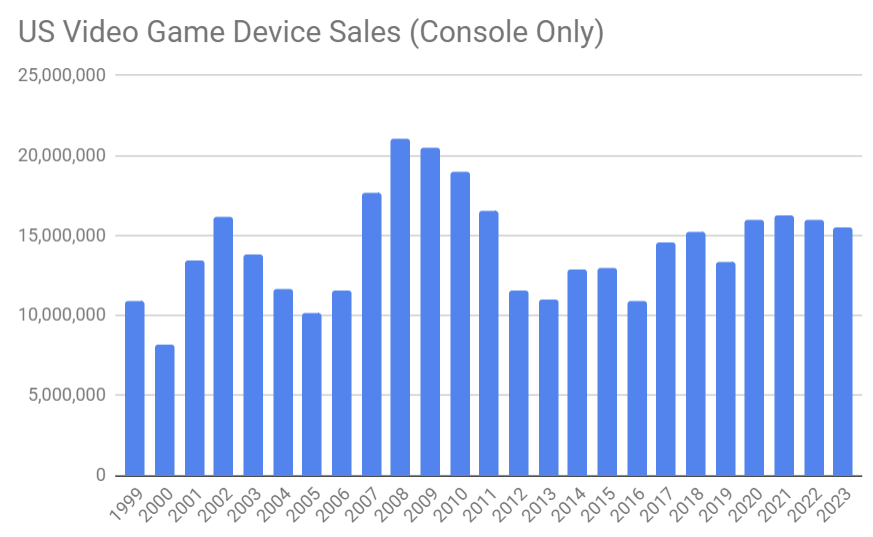State of the market
Projected U.S. total spending on video game hardware, content and accessories grew 2% in Feb vs YA, to $4.7B. 17% growth in Mobile content spending vs YA helped offset a 30% drop in hardware. (Mobile source: Sensor Tower)| Circana - U.S. Video Game Industry Sales - February 2024 (Dollars, Millions) Reporting Period: 2/4/2024 through 3/2/2024 (4 weeks) | Feb-23 | Feb-24 | Change |
|---|---|---|---|
| Total Video Game Sales | $4,636 | $4,714 | 2% |
| Video Game Content (Physical & Digital Full Game, DLC/MTX and Subscription consumer spending across Console, Cloud, Mobile*, Portable, PC and VR platforms) | $3,962 | $4,146 | 5% |
| Video Game Hardware | $498 | $349 | -30% |
| Video Game Accessories | $175 | $219 | 45% |
| Circana - U.S. Video Game Industry Sales - February 2023 (Dollars, Millions) Reporting Period: 12/30/2023 through 3/2/2024 (9 weeks) | YTD End Feb 2023 | YTD End Feb 2024 | Change |
|---|---|---|---|
| Total Video Game Sales | $9,058 | $9,783 | 8% |
| Video Game Content (Physical & Digital Full Game, DLC/MTX and Subscription consumer spending across Console, Cloud, Mobile*, Portable, PC, and VR platforms) | $7,819 | $8,590 | 10% |
| Video Game Hardware | $894 | $727 | -19% |
| Video Game Accessories | $345 | $465 | 35% |
Hardware
February video game hardware spending declined 30% when compared to a year ago, to $349 million. All console platforms were down a minimum of 19% compared to a year ago.PlayStation 5 led the February and year-to-date hardware market in both unit and dollar sales. Nintendo Switch finished 2nd in unit sales, while Xbox Series placed 2nd in dollars across both time periods.
Software
To go along with the growth in Mobile, February 2024 consumer spending in the PC, Cloud and Non-Console VR content segment increased by a high single-digit percentage when compared to a year ago, while both the Console as well as the Subscription content segments declined.Helldivers II debuted as the best-selling premium game of the year. Helldivers II launch month dollar sales represent the 7th highest total ever achieved by a Sony published title in the U.S. (excludes add-on content). Nearly 60% of Helldivers II sales in Feb came from Steam.
Final Fantasy VII Rebirth was the #2 best-selling premium game of February, instantly becoming the 4th best-selling game of 2024 YTD. Also debuting on the chart in February was the Final Fantasy VII Remake & Rebirth Twin Pack, placing 8th in February and at #16 for the year.
Dead Island 2 was released on Xbox Game Pass Ultimate in February without an announcement from either Microsoft or publisher Plaion prior to its release. This helped Dead Island 2 jump from #121 in Xbox Series monthly active users in January to 8th on the February chart.
Mobile
Sensor Tower reports the top 10 Mobile games by U.S. consumer spend in Feb and rank chg vs Jan as: MONOPOLY GO!, Royal Match, Roblox, Candy Crush Saga, Pokémon Go (+5), Coin Master (-1), Whiteout Survival, Clash of Clans (+1), Jackpot Party – Casino Slots (-1), and Township (-4).“The biggest news this month is that Sensor Tower data now shows that US mobile gaming spend is up a whopping 17% year-on-year in February 2024. This lift looks to be due to... games like MONOPOLY GO!, which didn't exist a year ago,” said Samuel Aune of Sensor Tower.
“Pokémon GO had some of its biggest annual events in February, leading to a 60% increase in spend for the month over its January 2024 revenue… Township drove 20% less spend than the previous month," said Samuel Aune of Sensor Tower.
Accessories
Accessories spending in February grew 25% when compared to a year ago to $219M, driven in part by a 14% increase in Gamepad spending and the new Remote Play Devices accessories segment (which includes PlayStation Portal).PlayStation Portal was the best-selling Accessory of February in dollar sales, while the PS5 Dual Sense Edge Wireless Controller remains the best-selling accessory of 2024 year-to-date.
Software Charts
| Rank | Prior Month | Game | Publisher | Weeks in Tracking |
|---|---|---|---|---|
| 1 | NEW | Helldivers II | Sony (Corp) | 4 |
| 2 | NEW | Final Fantasy VII: Rebirth | Square Enix Inc (Corp) | 1 |
| 3 | 1 | Call of Duty: Modern Warfare III (2023) | Activision Blizzard (Corp) | - |
| 4 | NEW | Skull and Bones | Ubisoft | 3 |
| 5 | 2 | Tekken 8 | Bandai Namco Entertainment | - |
| 6 | 5 | Madden NFL 24 [EA Sports] | Electronic Arts | - |
| 7 | 3 | Suicide Squad: Kill the Justice League | Warner Bros. Games | - |
| 8 | NEW | Final Fantasy VII: Remake & Rebirth Twin Pack | Square Enix Inc (Corp) | 1 |
| 9 | 4 | P3: Persona 3: Reload [Shin Megami Tensei] | Multiple Video Game Manufacturers | - |
| 10 | 6 | Hogwarts Legacy | Warner Bros. Games | - |
| 11 | NEW | Mario vs. Donkey Kong (2024)* | Nintendo | 3 |
| 12 | 8 | EA Sports FC 24 | Electronic Arts | - |
| 13 | 10 | Marvel’s Spider-Man 2 (Sony) | Sony (Corp) | - |
| 14 | 14 | Elden Ring | Bandai Namco Entertainment | - |
| 15 | 11 | Super Mario Bros Wonder* | Nintendo | - |
| 16 | 17 | Minecraft | Multiple Video Game Manufacturers | - |
| 17 | 18 | Mario Kart 8* | Nintendo | - |
| 18 | 15 | Mortal Kombat 1 | Warner Bros. Games | - |
| 19 | 21 | Rainbow Six: Siege [Tom Clancy's] | Ubisoft | - |
| 20 | 12 | Avatar: Frontiers of Pandora | Ubisoft | - |
Year to Date
| Rank | Prior Month | Game | Publisher | Weeks in Tracking |
|---|---|---|---|---|
| 1 | NEW | Helldivers II | Sony (Corp) | 4 |
| 2 | 1 | Call of Duty: Modern Warfare III (2023) | Activision Blizzard (Corp) | - |
| 3 | 2 | Tekken 8 | Bandai Namco Entertainment | 6 |
| 4 | NEW | Final Fantasy VII: Rebirth | Square Enix Inc (Corp) | 1 |
| 5 | 3 | Suicide Squad: Kill the Justice League | Warner Bros. Games | 5 |
| 6 | 5 | Madden NFL 24 [EA Sports] | Electronic Arts | - |
| 7 | 4 | P3: Persona 3: Reload [Shin Megami Tensei] | Multiple Video Game Manufacturers | 5 |
| 8 | 6 | Hogwarts Legacy | Warner Bros. Games | - |
| 9 | NEW | Skull and Bones | Ubisoft | 3 |
| 10 | 8 | EA Sports FC 24 | Electronic Arts | - |
| 11 | 10 | Marvel’s Spider-Man 2 (Sony) | Sony (Corp) | - |
| 12 | 7 | Like a Dragon: Infinite Wealth | Sega | 6 |
| 13 | 9 | The Last of Us: Part II | Sony (Corp) | - |
| 14 | 11 | Super Mario Bros Wonder* | Nintendo | - |
| 15 | 14 | Elden Ring | Bandai Namco Entertainment | - |
| 16 | NEW | Final Fantasy VII: Remake & Rebirth Twin Pack | Square Enix Inc (Corp) | 1 |
| 17 | 12 | Avatar: Frontiers of Pandora | Ubisoft | - |
| 18 | 17 | Minecraft | Multiple Video Game Manufacturers | - |
| 19 | 15 | Mortal Kombat 1 | Warner Bros. Games | - |
| 20 | 18 | Mario Kart 8* | Nintendo | - |
PlayStation Platforms
| Rank | Prior Month | Game | Publisher | Weeks in Tracking |
|---|---|---|---|---|
| 1 | NEW | Helldivers II | Sony (Corp) | 4 |
| 2 | NEW | Final Fantasy VII: Rebirth | Square Enix Inc (Corp) | 1 |
| 3 | 1 | Call of Duty: Modern Warfare III (2023) | Activision Blizzard (Corp) | - |
| 4 | NEW | Final Fantasy VII: Remake & Rebirth Twin Pack | Square Enix Inc (Corp) | 1 |
| 5 | NEW | Skull and Bones | Ubisoft | 3 |
| 6 | 5 | Madden NFL 24 [EA Sports] | Electronic Arts | - |
| 7 | 3 | Suicide Squad: Kill the Justice League | Warner Bros. Games | - |
| 8 | 2 | Tekken 8 | Bandai Namco Entertainment | - |
| 9 | 7 | Marvel’s Spider-Man 2 (Sony) | Sony (Corp) | - |
| 10 | 4 | P3: Persona 3: Reload [Shin Megami Tensei] | Multiple Video Game Manufacturers | - |
Xbox Platforms
| Rank | Prior Month | Game | Publisher | Weeks in Tracking |
|---|---|---|---|---|
| 1 | 1 | Call of Duty: Modern Warfare III (2023) | Activision Blizzard (Corp) | - |
| 2 | NEW | Skull and Bones | Ubisoft | 3 |
| 3 | 2 | Madden NFL 24 [EA Sports] | Electronic Arts | - |
| 4 | 3 | Suicide Squad: Kill the Justice League | Warner Bros. Games | - |
| 5 | 4 | Tekken 8 | Bandai Namco Entertainment | - |
| 6 | 5 | Hogwarts Legacy | Warner Bros. Games | - |
| 7 | 6 | EA Sports FC 24 | Electronic Arts | - |
| 8 | 7 | Avatar: Frontiers of Pandora | Ubisoft | - |
| 9 | 10 | Elden Ring | Bandai Namco Entertainment | - |
| 10 | 17 | Call of Duty: Black Ops III | Activision Blizzard (Corp) | - |
Nintendo Platforms
| Rank | Prior Month | Game | Publisher | Weeks in Tracking |
|---|---|---|---|---|
| 1 | NEW | Mario vs. Donkey Kong (2024)* | Nintendo | 3 |
| 2 | 1 | Super Mario Bros Wonder* | Nintendo | - |
| 3 | 3 | Hogwarts Legacy | Warner Bros. Games | - |
| 4 | 2 | Mario Kart 8* | Nintendo | - |
| 5 | 6 | Super Smash Bros. Ultimate* | Nintendo | - |
| 6 | 4 | Just Dance 2024 Edition | Ubisoft | - |
| 7 | 7 | The Legend of Zelda: Tears of the Kingdom* | Nintendo | - |
| 8 | 8 | Pokemon: Scarlet/Violet* | Nintendo | - |
| 9 | 9 | Minecraft* | Nintendo | - |
| 10 | 10 | Mario Party Superstars* | Nintendo | - |
Monthly Active User Engagement
Top 10 Games Played on PlayStation 5 Ranked by Monthly Active Users (US)
Top 10 Games Played on PlayStation 5 Ranked by Monthly Active Users (US)
| Rank | Prior Month | Game | Publisher | Weeks in Tracking |
|---|---|---|---|---|
| 1 | 1 | Fortnite | Epic Games | - |
| 2 | 2 | Call of Duty HQ* | Activision | - |
| 3 | 3 | Grand Theft Auto V (Remastered) | Rockstar Games | - |
| 4 | 5 | NBA 2K24 | 2K Sports | - |
| 5 | 6 | Madden NFL 24 [EA Sports] | Electronic Arts | - |
| 6 | 4 | Roblox | Roblox Corporation | - |
| 7 | NEW | Helldivers II | Sony Interactive Entertainment Worldwide Studios | 4 |
| 8 | 8 | Marvel's Spider-Man 2 (Sony) | Sony Interactive Entertainment Inc. | - |
| 9 | 11 | Apex Legends | Electronic Arts | - |
| 10 | 12 | Minecraft | Mojang Studios, Xbox Game Studios | - |
Top 10 Games Played on Xbox Series Ranked by Monthly Active Users (US)
| Rank | Prior Month | Game | Publisher |
|---|---|---|---|
| 1 | 1 | Fortnite | Epic Games |
| 2 | 2 | Call of Duty HQ* | Activision |
| 3 | 3 | Palworld | Pocket Pair Inc. |
| 4 | 9 | Madden NFL 24 [EA Sports] | Electronic Arts |
| 5 | 4 | Grand Theft Auto V (Remastered) | Rockstar Games |
| 6 | 5 | Roblox | Roblox Corporation |
| 7 | 6 | Minecraft | Mojang Studios, Xbox Game Studios |
| 8 | 121 | Dead Island 2 | Deep Silver |
| 9 | 7 | Rainbow Six: Siege [Tom Clancy's] | Ubisoft Entertainment SA |
| 10 | 12 | Apex Legends | Electronic Arts |
Top 10 Games Played on Steam Ranked by Monthly Active Users (US)
| Rank | Prior Month | Game | Publisher | Weeks in Tracking |
|---|---|---|---|---|
| 1 | NEW | Helldivers II | Sony Interactive Entertainment Worldwide Studios | 4 |
| 2 | 1 | Palworld | Pocket Pair Inc. | - |
| 3 | 3 | Counter-Strike 2 | Valve | - |
| 4 | 2 | Lethal Company | Zeekerss | - |
| 5 | 4 | Baldur's Gate III | Larian Studios | - |
| 6 | 7 | Enshrouded | Keen Games | - |
| 7 | 113 | Last Epoch | Eleventh Hour Games | - |
| 8 | 6 | Rocket League | Psyonix | - |
| 9 | 5 | The Finals | Embark Studios | - |
| 10 | 16 | Elden Ring | Bandai Namco Entertainment Inc. | - |
Rankings
Units: PS5 > NSW > XBS
Revenue: PS5 > XBS > NSW
Update
Each console is down at least 19% YOY in revenue. Xbox Series is the console at -19%. Other console fell more.
Thanks Mat Piscatella!
NPD Archives
Last edited:













